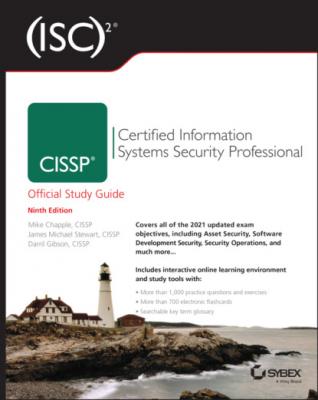(ISC)2 CISSP Certified Information Systems Security Professional Official Study Guide. Mike Chapple
Чтение книги онлайн.
Читать онлайн книгу (ISC)2 CISSP Certified Information Systems Security Professional Official Study Guide - Mike Chapple страница 96

European Union General Data Protection Regulation
The European Union passed a new, comprehensive law covering the protection of personal information in 2016. The General Data Protection Regulation (GDPR) went into effect in 2018 and replaced the DPD on that date. The main purpose of this law is to provide a single, harmonized law that covers data throughout the European Union, bolstering the personal privacy protections originally provided by the DPD.
A major difference between the GDPR and the data protection directive is the widened scope of the regulation. The new law applies to all organizations that collect data from EU residents or process that information on behalf of someone who collects it. Importantly, the law even applies to organizations that are not based in the EU, if they collect information about EU residents. Depending on how this is interpreted by the courts, it may have the effect of becoming an international law because of its wide scope. The ability of the EU to enforce this law globally remains an open question.
The key provisions of the GDPR include the following:
Lawfulness, fairness, and transparency says that you must have a legal basis for processing personal information, you must not process data in a manner that is misleading or detrimental to data subjects, and you must be open and honest about data processing activities.
Purpose limitation says that you must clearly document and disclose the purposes for which you collect data and limit your activity to disclosed purposes.
Data minimization says that you must ensure that the data you process is adequate for your stated purpose and limited to what you actually need for that purpose.
Accuracy says that the data you collect, create, or maintain is correct and not misleading, that you maintain updated records, and that you correct or erase inaccurate data.
Storage limitation says that you keep data only for as long as it is needed to fulfill a legitimate, disclosed purpose and that you comply with the “right to be forgotten” that allows people to require companies to delete their information if it is no longer needed
Security says that you must have appropriate integrity and confidentiality controls in place to protect data.
Accountability says that you must take responsibility for actions you take with protected data and that you must be able to demonstrate your compliance.
Cross-Border Information Sharing
GDPR is of particular concern when transferring information across international borders. Organizations needing to conduct transfers between their subsidiaries have two options available for complying with EU regulations:
Organizations may adopt a set of standard contractual clauses that have been approved for use in situations where information is being transferred outside of the EU. Those clauses are found on the EU website (ec.europa.eu/info/law/law-topic/data-protection/international-dimension-data-protection/standard-contractual-clauses-scc_en) and are available for integration into contracts.
Organizations may adopt binding corporate rules that regulate data transfers between internal units of the same firm. This is a very time-consuming process—the rules must be approved by every EU member nation where they will be used, so typically this path is only adopted by very large organizations.
In the past the European Union and the United States operated a safe harbor agreement called Privacy Shield. Organizations were able to certify their compliance with privacy practices through independent assessors and, if awarded the privacy shield, were permitted to transfer information.
However, a 2020 ruling by the European Court of Justice in a case called Schrems II declared the EU/US Privacy Shield invalid. Currently, companies may not rely on the Privacy Shield and must use either standard contractual clauses or binding corporate rules. This may change in the future if the Privacy Shield is modified to meet EU requirements.
In some cases, conflicts arise between laws of different nations. For example, electronic discovery rules in the United States might require the production of evidence that is protected under GDPR. In those cases, privacy professionals should consult with attorneys to identify an appropriate course of action.
Canadian Privacy Law
Canadian law affects the processing of personal information related to Canadian residents. Chief among these, the Personal Information Protection and Electronic Documents Act (PIPEDA) is a national-level law that restricts how commercial businesses may collect, use, and disclose personal information.
Generally speaking, PIPEDA covers information about an individual that is identifiable to that individual. The Canadian government provides the following examples of information covered by PIPEDA:
Race, national, or ethnic origin
Religion
Age
Marital status
Medical, education, or employment history
Financial information
DNA
Identifying numbers
Employee performance records
The law excludes information that does not fit the definition of personal information, including the following examples provided by the Information Commissioner of Canada:
Information that is not about an individual, because the connection with a person is too weak or far-removed
Information about an organization such as a business
Information that has been rendered anonymous, as long as it is not possible to link that data back to an identifiable person
Certain information about public servants such as their name, position, and title
A person's business contact information that an organization collects, uses, or discloses for the sole purpose of communicating with that person in relation to their employment, business, or profession
PIPEDA may also be superseded by province-specific laws that are deemed substantially similar to PIPEDA. These laws currently exist in Alberta, British Columbia, and Quebec. PIPEDA generally does not apply to nonprofit organizations, municipalities, universities, schools, and hospitals.
State Privacy Laws
In addition to the federal